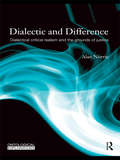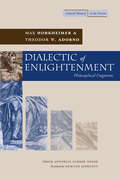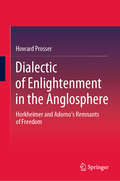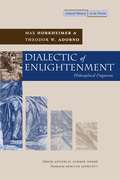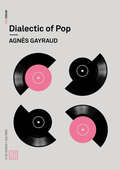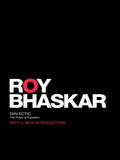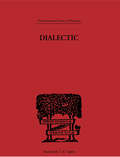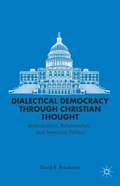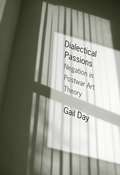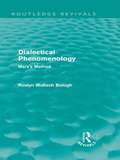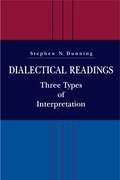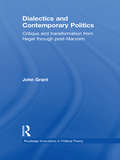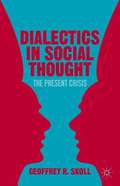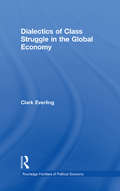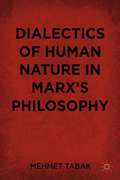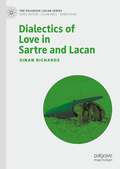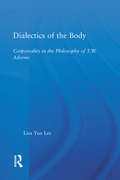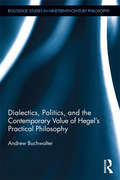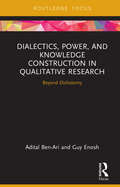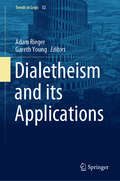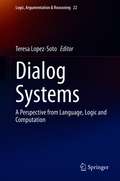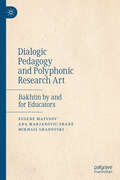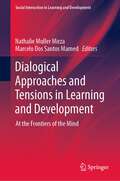- Table View
- List View
Dialectic and Difference: Dialectical Critical Realism and the Grounds of Justice
by Alan NorrieDialectic and Difference is the first systematic exploration of Roy Bhaskar’s dialectical philosophy and its implications for ethics and justice. That philosophy has three aims: a dialecticisation of original critical realism, a ‘critical realisation’ of dialectic, and a metacritique of western philosophy. In the first, real absence or negativity links structured being to dialectical becoming in a dynamic world. The second draws on Marx to locate the critical impulse in Hegel’s dialectic in a material, open and changing totality. The third identifies a central problem in western philosophy from the Greeks on, the failure to think real negativity as the essence of change (‘ontological monovalence’). Bhaskar’s ethics connect basic human ontology with universal principles of freedom and solidarity. He marries (‘constellates’) these with a grasp of how principles are historically shaped. His account of freedom moves from the infant’s ‘primal scream’ to the eudaimonic society, but thinks the limits to freedom under modern conditions. The morally real in ethics and justice is displaced and reconfigured as relations between ‘the ideal’ and ‘the actual’. Western philosophy systematically denies the real negativity that drives Bhaskar’s dialectic. Metacritique traces this to Parmenides and Plato’s account of non-being as difference. It enables a critique of the poststructural radicalisation of difference via Nietzsche and the doctrine of ‘Heraclitan flux’. Mobilised as ‘the other’ of Plato’s Forms, this remains a move on Platonic terrain. It too denies real negativity in structured being as the ground of historical change and moral praxis. This text is essential reading for all serious students of social theory, philosophy, and legal theory.
Dialectic of Enlightenment
by Max Horkheimer Theodor W. AdornoDialectic of Enlightenment is undoubtedly the most influential publication of the Frankfurt School of Critical Theory. Written during the Second World War and circulated privately, it appeared in a printed edition in Amsterdam in 1947. "What we had set out to do," the authors write in the Preface, "was nothing less than to explain why humanity, instead of entering a truly human state, is sinking into a new kind of barbarism. " Yet the work goes far beyond a mere critique of contemporary events. Historically remote developments, indeed, the birth of Western history and of subjectivity itself out of the struggle against natural forces, as represented in myths, are connected in a wide arch to the most threatening experiences of the present. The book consists in five chapters, at first glance unconnected, together with a number of shorter notes. The various analyses concern such phenomena as the detachment of science from practical life, formalized morality, the manipulative nature of entertainment culture, and a paranoid behavioral structure, expressed in aggressive anti-Semitism, that marks the limits of enlightenment. The authors perceive a common element in these phenomena, the tendency toward self-destruction of the guiding criteria inherent in enlightenment thought from the beginning. Using historical analyses to elucidate the present, they show, against the background of a prehistory of subjectivity, why the National Socialist terror was not an aberration of modern history but was rooted deeply in the fundamental characteristics of Western civilization. Adorno and Horkheimer see the self-destruction of Western reason as grounded in a historical and fateful dialectic between the domination of external nature and society. They trace enlightenment, which split these spheres apart, back to its mythical roots. Enlightenment and myth, therefore, are not irreconcilable opposites, but dialectically mediated qualities of both real and intellectual life. "Myth is already enlightenment, and enlightenment reverts to mythology. " This paradox is the fundamental thesis of the book. This new translation, based on the text in the complete edition of the works of Max Horkheimer, contains textual variants, commentary upon them, and an editorial discussion of the position of this work in the development of Critical Theory.
Dialectic of Enlightenment in the Anglosphere: Horkheimer and Adorno's Remnants of Freedom
by Howard ProsserThis book explores the reception of Max Horkheimer and Theodor W. Adorno’s Dialectic of Enlightenment. It examines a variety of perspectives on the text, supplied by e.g. American critical theorists, British New Leftists, Transatlantic Cultural Studies scholars, Postmodernists, and those working in the current after-theory moment from 1970 to 2010. It considers the works of the Frankfurt School, especially Horkheimer and Adorno, alongside the secondary literature on the subject. The main focus is on how various intellectual circles and trends have responded to the Dialectic, making scholarly discussions the primary sources. While the work is a history of the Dialectic of Enlightenment’s Anglophone reception, it also reflects the post-1968 left’s retreat to academia, which echoes the Frankfurt School’s own stance of political resignation.
Dialectic of Enlightenment: Philosophical Fragments
by Max Horkheimer Theodor W. Adorno Edmund JephcottIn 1947, philosophers Horkheimer (1895-1973) and Adorno (1903-69) joined forces to explain why humanity, instead of entering a truly human state, is sinking into a new kind of barbarism. They attribute the relapse into mythology not so much to the nationalist, pagan, or other modern mythologies concocted specifically to cause such a relapse, but to a fear of truth that petrifies enlightenment itself. Edmund Jephcott translates the German text from volume five of Horkheimer's collected works. There is no index. Annotation c. Book News, Inc. , Portland, OR (booknews. com)
Dialectic of Pop (Urbanomic: Mono #8)
by Agnes GayraudA philosophical exploration of pop music that reveals a rich, self-reflexive art form with unsuspected depths. In the first major philosophical treatise on the subject, Agnès Gayraud explores all the paradoxes of pop—its inauthentic authenticity, its mass production of emotion and personal resonance, its repetitive novelty, its precision engineering of seduction—and calls for pop (in its broadest sense, encompassing all genres of popular recorded music) to be recognized as a modern, technologically mediated art form to rank alongside cinema and photography. In a thoroughgoing engagement with Adorno's fierce critique of "standardized light popular music," Dialectic of Pop tracks the transformations of the pop form and its audience over the course of the twentieth century, from Hillbilly to Beyoncé, from Lead Belly to Drake. Inseparable from the materiality of its technical media, indifferent and intractable to the perspectives of high culture, pop subverts notions of authenticity and inauthenticity, original and copy, aura and commodity, medium and message. Gayraud demonstrates that, far from being the artless and trivial mass-produced pabulum denigrated by Adorno, pop is a rich, self-reflexive artform that recognises its own contradictions, incorporates its own productive negativity, and often flourishes by thinking "against itself."Dialectic of Pop sings the praises of pop as a constitutively impure form resulting from the encounter between industrial production and the human predilection for song, and diagnoses the prospects for twenty-first century pop as it continues to adapt to ever-changing technological mediations.
Dialectic: The Pulse of Freedom (Classical Texts In Critical Realism (routledge Critical Realism) Ser.)
by Roy BhaskarDialectic: The Pulse of Freedom is now widely regarded as a classic of contemporary philosophy. This book, first published in 1993, sets itself three main aims: the development of a general theory of dialectic, of which Hegelian dialectic can be seen to be a special case; the dialectical enrichment and deepening of critical realism, viz. into the system of dialectical critical realism; and the outline of the elements of a totalizing critique of Western philosophy. The first chapter clarifies the rational core of Hegelian dialectic. Chapter 2 then proceeds to develop a general theory of dialectic. Isolating the fallacy of "ontological monovalence", i.e. a purely positive account of being, Roy Bhaskar then shows how absence and other negating concepts such as contradiction have a legitimate and necessary ontological employment. He then goes on to give a synoptic account of key dialectical concepts such as the concrete universal; to sketch the further dialectical development of critical naturalism through an account of what he calls four-planar social being; and following consideration of the dialectical critique of analytical reason, he moves on to the real definition of dialectic as absenting absence and in the human sphere, the axiology of freedom. Chapter 3 extends and deepens critical realism’s characteristic concerns with ontology, science, social science and emancipation not only into the realms of negativity and totality, but also into the fields of reference and truth, spatio-temporality, tense and process, the logic of dialectical universalizability and on to the plane of ethics, where it articulates a combination of moral realism and ethical naturalism, whereby consideration of elemental desire involves commitment to the eudaimonistic society. This is then followed—in Chapter 4—by a sublime discussion of key moments in the trajectory of Western philosophy, the tradition of which can now be seen to be based on what the author calls the unholy trinity of the epistemic fallacy or the reduction of being to knowledge, primal squeeze or the collapse of structure and alethic truth, and ontological monovalence.
Dialectic: Towards The Foundations Of Political Philosophy (International Library of Philosophy)
by Mortimer J. AdlerFirst published in 2000. Routledge is an imprint of Taylor & Francis, an informa company.
Dialectical Democracy through Christian Thought: Individualism, Relationalism, and American Politics
by David R. BrockmanDialectical Democracy through Christian Thought offers an accessible yet theologically groundbreaking intervention into the battle over the role of government in the market. This book shows that the fight over policy involves a fundamental disagreement about who we are as human beings: independent individuals, or essentially social creatures.
Dialectical Passions: Negation in Postwar Art Theory
by Gail DayRepresenting a new generation of theorists who reaffirm the radical dimensions of art, Gail Day launches a bold critique of late-twentieth-century art theory and its often reductive analysis of cultural objects. Exploring core debates in discourses on art, from the New Left to theories of "critical postmodernism" and beyond, Day counters the belief that recent tendencies in art fail to be adequately critical and challenges the political inertia that results from these conclusions. Day organizes her defense around critics who have engaged substantively with emancipatory thought and social process: T. J. Clark, Manfredo Tafuri, Fredric Jameson, Benjamin H. D. Buchloh, and Hal Foster, among others. She maps the tension between radical dialectics and left nihilism and assesses the interpretation and internalization of negation in art theory. Chapters confront the claim that exchange and equivalence have subsumed the use value of cultural objects& mdash;and with it critical distance; the meaning of symbol and allegory in 1980s art and its limited reading of the writings of Walter Benjamin and Paul de Man; and common conceptions of mediation, totality, and the politics of anticipation. A necessary unsettling of received wisdoms, Dialectical Passions sets a new course for emancipatory reflection in aesthetics, art, and architecture.
Dialectical Passions: Negation in Postwar Art Theory (Columbia Themes in Philosophy, Social Criticism, and the Arts)
by Gail DayRepresenting a new generation of theorists reaffirming the radical dimensions of art, Gail Day launches a bold critique of late twentieth-century art theory and its often reductive analysis of cultural objects. Exploring core debates in discourses on art, from the New Left to theories of "critical postmodernism" and beyond, Day counters the belief that recent tendencies in art fail to be adequately critical. She also challenges the political inertia that results from these conclusions.Day organizes her defense around critics who have engaged substantively with emancipatory thought and social process: T. J. Clark, Manfredo Tafuri, Fredric Jameson, Benjamin H. D. Buchloh, and Hal Foster, among others. She maps the tension between radical dialectics and left nihilism and assesses the interpretation and internalization of negation in art theory. Chapters confront the claim that exchange and equivalence have subsumed the use value of cultural objects-and with it critical distance- and interrogate the proposition of completed nihilism and the metropolis put forward in the politics of Italian operaismo. Day covers the debates on symbol and allegory waged within the context of 1980s art and their relation to the writings of Walter Benjamin and Paul de Man. She also examines common conceptions of mediation, totality, negation, and the politics of anticipation. A necessary unsettling of received wisdoms, Dialectical Passions recasts emancipatory reflection in aesthetics, art, and architecture.
Dialectical Phenomenolgy: Marx's Method (Routledge Revivals)
by Roslyn Wallach BologhIn this inquiry into Marx’s method of theorising, originally published in 1979, Roslyn Bologh analyses theory in the same way that Marx analyses the production of capital, and provides a set of rules for reproducing Marx’s method. The rules are developed through an examination of the Grundrisse, a text by Marx that combines his technical critique of political economy with his humanistic, philosophical concerns and his historical perspective. Dr Bologh concludes that Marx’s method, as dialectical phenomenology, offers a way of analysing language, knowledge and the social relations and practices of everyday life, as well as the more obvious phenomena of capitalism.
Dialectical Readings: Three Types of Interpretations
by Stephen N. DunningInterpretation pervades human thinking. Whether perception or experience, spoken word or written theory, whatever enters our consciousness must be interpreted in order to be understood. Every area of inquiry—art and literature, philosophy and religion, history and the social sciences, even many aspects of the natural sciences—involves countless opportunities to interpret the object of inquiry according to very different paradigms. These paradigms may derive from the language we speak, the nature of our education, or personal preferences. The abundance and diversity of paradigms make interpretation both fascinating in its complexity and often frustrating for the conflicts it generates. In Dialectical Readings, Dunning distinguishes three types of interpretation, each defined in terms of a distinctive dialectical way of thinking: theoretical interpretation, which assumes binary oppositions; transactional interpretation, which seeks reciprocal relations; and transformational interpretation, which discerns paradoxical meanings. Dunning offers new and insightful readings of familiar texts by B. F. Skinner, Claude Lévi-Strauss, Lee Benson, Roland Barthes, Friedrich Nietzsche, and Michel Foucault and sheds new light on works by Thomas Kuhn, Joseph Campbell, Reinhold Niebuhr, Søren Kierkegaard, Paul Tillich, and Paul Ricoeur. Dialectical Readings enables readers to recognize diverse dialectical approaches to understanding—their own as well as those of others—in a way that provides new and helpful insights into a wide variety of subjects in which conflicting interpretations abound.
Dialectics and Contemporary Politics: Critique and Transformation from Hegel through Post-Marxism (Routledge Innovations in Political Theory)
by John GrantDialectics and Contemporary Politics recasts dialectical thought for a post-Marxist age in which labour movement politics is just one political option among many. The book is organized thematically around concepts such as immanent critique, ideology, experience, and resistance, and according to figures who are vital to the present trajectory of dialectics, including Hegel, Adorno, Foucault, Jameson and Žizek. New analysis of these concepts and theorists is used to show how they transform our understanding of social life as well as offer a way of understanding social transformation. Interspersed throughout this theoretical work are dialectical examinations of political phenomena from tolerance, democracy, and the rise of Barack Obama, to state-economy relations as well as those of power and resistance. A radical and often revolutionary theory of society is pursued that is no longer confined to the terms of Marxism or any other school of thought. In this regard a novel advance is made by presenting the history of dialectical criticism as an ‘anti-tradition,’ which is defined as a practice that is characterized by a history of discontinuity, discord, and incompatible applications. A theory of dialectics emerges that is flexible, coherent, and which can account for much more than capitalism and class politics. This work will be of great interest to all scholars of Marxism, critical theory, social and political theory and political philosophy
Dialectics in Social Thought: The Present Crisis
by Geoffrey R. SkollDialectics in Social Thought examines the work of thinkers who used dialectics in their attempts to understand the world. Among them are foundational thinkers such as Marx, Freud, and Nietzsche; seminal social critics of the last century such as Camus and Sartre; and current contributors like Badiou, Ranci#65533;re, and Žižek.
Dialectics of Class Struggle in the Global Economy (Routledge Frontiers Of Political Economy Ser. #Vol. 123)
by Clark EverlingMuch ink has been spilled in attempts to prove that humans are only animals and are, like other species, only aggressive. Marx distinguishes both class and cooperative relations as inorganic: humans create their subjectivity through their mutual social production. They build upon their previous forms of social production and, with capitalism, become not only an opposition of classes, but have the capacity for urban individualism and cooperation. Dialectics of Class Struggle examines the historical development of classes from ancient times to present. It analyses the development of ancient slavery into feudalism and the latter into capitalism. It focuses on the laws and limits of capitalist development, the contradictions inherent in the capitalist state, revolutions in the twentieth century and the possibilities for human freedom that they revealed. It concludes with an examination of class struggles in the global economy and shows the human deprivations as well as the human possibilities.
Dialectics of Human Nature in Marx�s Philosophy
by Mehmet TabakA scholarly exploration of Marx's thought without any favorable or critical ideological agendas, this book opposes the compartmentalization of Marx's thought into various competing doctrines, such as historical materialism, dialectical materialism, and different forms of economic determinism. It highlights Marx's humanism; however, instead of pitting Marx's humanism against materialism, dialectical and historical, this book demonstrates their unity in a novel way. The method employed is exegetical, with an emphasis on Marx's own dialectic method. This approach differentiates the present work from the currently popular interpretations, which (mis)interpret Marx through the prism of analytical philosophy.
Dialectics of Love in Sartre and Lacan (The Palgrave Lacan Series)
by Sinan RichardsWhat is love for Sartre and Lacan? In Dialectics of Love in Sartre and Lacan, Sinan Richards examines Sartre’s and Lacan’s writings on love to draw out a distinctly Lacanian conception of love and subjectivity. Richards begins by demonstrating how Sartre’s in itself for itself is a convincing shorthand for Lacan’s central object of study, before presenting and explaining the various aspects of Lacan’s psychophilosophical project to show how, for Lacan, the subject is marked by various pathologies. He argues that, for Lacan, as for Sartre and Schelling before him, the subject is ontologically sick, and, by its very structure, the Oedipus complex produces subjects that are prey to a mental collapse at any moment. As a result, for Lacan, the subject has no choice but to identify with their potential madness, a constitutive aspect of their subjectivity. He concludes by making a compelling case that love in the Lacanian schema is the subject’s mad wish to reunite in itself with for itself, which is an always impossible yet necessary aspect of subjectivity. The book presents fresh insights on Lacan and Sartre that will appeal to students and scholars of psychoanalysis, philosophy, comparative literature and critical theory.
Dialectics of the Body: Corporeality in the Philosophy of Theodor Adorno
by Lisa Yun LeeThe study of Theodor Adorno has largely ignored or dismissed the enigmatic and provocative moments in his writing on the body. Dialectics of the Body corrects this gap by arguing that Adorno's analysis of reified society emanates and returns to the body and that hope and desire are present throughout Adorno's philosophy.
Dialectics, Politics, and the Contemporary Value of Hegel's Practical Philosophy (Routledge Studies in Nineteenth-Century Philosophy)
by Andrew BuchwalterThis book explores and details the actuality (Aktualität) of Hegel’s social and political philosophy--its relevance, topicality, and contemporary validity. It asserts--against the assumptions of those in a wide range of traditions--that Hegel’s thought not only remains relevant to debates in current social and political theory, but is capable of productively enhancing and enriching those debates. The book is divided into three main sections. Part 1 considers the actuality of Hegel’s social and political thought in the context of a constructed dialogues with later social and political theorists, including Marx, Adorno, Habermas, and Rawls. Part 2 explores Hegel’s internal criticism of Enlightenment rationality as well as the unique manner in which his thought reaffirms both the classical tradition of politics and the Christian conception of freedom in order to deepen and further develop our understanding of modernity and modern secularity. Part 3 considers Hegel’s contribution to current theorizing about globalization.
Dialectics, Power, and Knowledge Construction in Qualitative Research: Beyond Dichotomy (Routledge Advances in Research Methods)
by Adital Ben-Ari Guy EnoshThis book is about going beyond dichotomy. The research literature in social sciences is full of apparent dichotomies such as the dichotomy between: qualitative and quantitative approaches; "reality" and "multiple-realities"; ontology and epistemology; researchers and participants; the right and wrong conduct of research; and sometimes even between the goals of research and the ethics of research. Throughout the book, it is shown that adopting a dialectical approach, which attempts to integrate apparent contradictions and opposites at a higher level of abstraction, may serve as a way out of the twin horns of such dilemmas. To begin this journey, the authors start with the classical dilemma of the relationship between "reality" and "knowledge", as a common divide between the quantitative and qualitative epistemological paradigms, and the philosophical assumptions underlying them. To illustrate the understanding of the relationship between knowledge and reality, metaphors of "maps and territories" are used as a framework for the dialectical construction of knowledge. This book will be valuable to a diverse readership, including scholars interested in epistemology and philosophy of science and research methods, mainly from qualitative traditions. It will also be of interest to quantitative researchers as well, including supervisors of graduate students, lecturers and, most importantly, students and researchers-to-be.
Dialetheism and its Applications (Trends in Logic #52)
by Adam Rieger Gareth YoungThe purpose of this book is to present unpublished papers at the cutting edge of research on dialetheism and to reflect recent work on the applications of the theory. It includes contributions from some of the most respected scholars in the field, as well as from young, up-and-coming philosophers working on dialetheism.Moving from the fringes of philosophy to become a main player in debates concerning truth and the logical paradoxes, dialetheism has thrived since the publication of Graham Priest’s In Contradiction, and several of the papers find their roots in a conference on dialetheism held in Glasgow to mark the 25th anniversary of Priest’s book. The content presented here demonstrates the considerable body of work produced in this field in recent years.With a broad focus, this book also addresses the applications of dialetheism outside the more familiar area of the logical paradoxes, and includes pieces discussing the application of dialetheism in metaphysics, philosophy of language, and philosophy of mind.
Dialog Systems: A Perspective from Language, Logic and Computation (Logic, Argumentation & Reasoning #22)
by Teresa Lopez-SotoThis book focuses on dialog from a varied combination of fields: Linguistics, Philosophy of Language and Computation. It builds on the hypothesis that meaning in human communication arises at the discourse level rather than at the word level. The book offers a complex analytical framework and integration of the central areas of research around human communication. The content revolves around meaning but it also gives evidence of the connection among different points of view. Besides discussing issues of general interest to the field, the book triggers theoretical argumentation that is currently under scientific discussion. It examines such topics as immanent reasoning joined with Recanati's lekta and free enrichment, challenges of internet conversation, inner dialogs, cognition and language, and the relation between assertion and denial. It proposes a dialogical framework for intra-negotiation and gives a geolinguistic perspective on spoken discourse. Finally, it examines dialog and abduction and sheds light on a generation of dialog contexts by means of multimodal logic applied to speech acts.
Dialogic Pedagogy and Polyphonic Research Art: Bakhtin by and for Educators
by Ana Marjanovic-Shane Eugene Matusov Mikhail GradovskiThis book presents voices of educators describing their pedagogical practices inspired by the ethical ontological dialogism of Mikhail M. Bakhtin. It is a book of educational practitioners, by educational practitioners, and primarily for educational practitioners. The authors provide a dialogic analysis of teaching events in Bakhtin-inspired classrooms and emerging issues, including: prevailing educational relationships of power, desires to create a so-called educational vortex in which all students can experience ontological engagement, and struggles of innovative pedagogy in conventional educational institutions. Matusov, Marjanovic-Shane, and Gradovski define a dialogic research art, in which the original pedagogical dialogues are approached through continuing dialogues about the original issues, and where the researchers enter into them with their mind and heart.
Dialogic Pedagogy and Polyphonic Research Art: Bakhtin by and for Educators
by Ana Marjanovic-Shane Eugene Matusov Mikhail GradovskiThis book presents voices of educators describing their pedagogical practices inspired by the ethical ontological dialogism of Mikhail M. Bakhtin. It is a book of educational practitioners, by educational practitioners, and primarily for educational practitioners. The authors provide a dialogic analysis of teaching events in Bakhtin-inspired classrooms and emerging issues, including: prevailing educational relationships of power, desires to create a so-called educational vortex in which all students can experience ontological engagement, and struggles of innovative pedagogy in conventional educational institutions. Matusov, Marjanovic-Shane, and Gradovski define a dialogic research art, in which the original pedagogical dialogues are approached through continuing dialogues about the original issues, and where the researchers enter into them with their mind and heart.
Dialogical Approaches and Tensions in Learning and Development: At the Frontiers of the Mind (Social Interaction in Learning and Development)
by Nathalie Muller Mirza Marcelo Dos Santos MamedThe book pursues the goal of exploring and strengthening a dialogical approach of communication and cognition. It brings together contributions from world-leading researchers related to the dialogical approach in education and psychology. It presents, among others, the place of language and materiality in the development of communication and thinking, as well as the role of the methods in the relationship between researchers and participants. This leads to an innovative definition of the dialogicality and how a dialogical approach can provide heuristic (conceptual and methodological) tools to better understand how people think, communicate and learn in a complex world.The authors hereby develop an epistemological framework inspired by scholars such as Michaïl Bakhtin, Lev Vygotsky and Herbert Mead under the assumption that dialogue, or dialogicality - and therefore the presence of the other – is fundamentally entangled into the human thinking and development.This book contributes to the understanding of human communication, cognition and mind, and participates in a scientific dialogue which helps to advance future research. It includes theoretical and empirical chapters and presents innovative methods of inquiry, which makes it a useful tool for both teaching and research.
